托福听力测试
tpo托福听力练习题
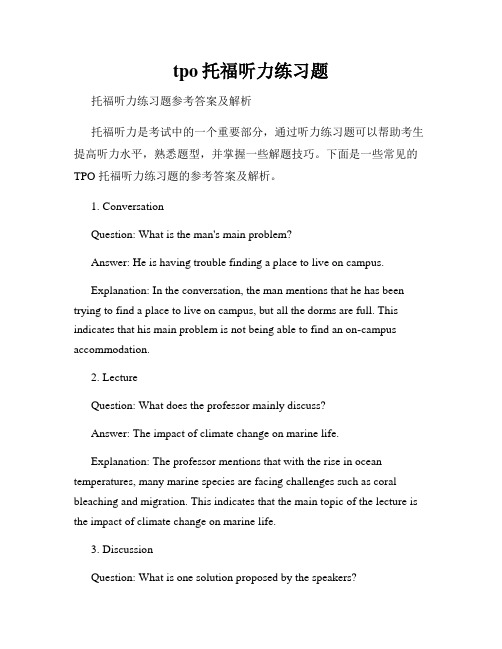
tpo托福听力练习题托福听力练习题参考答案及解析托福听力是考试中的一个重要部分,通过听力练习题可以帮助考生提高听力水平,熟悉题型,并掌握一些解题技巧。
下面是一些常见的TPO 托福听力练习题的参考答案及解析。
1. ConversationQuestion: What is the man's main problem?Answer: He is having trouble finding a place to live on campus.Explanation: In the conversation, the man mentions that he has been trying to find a place to live on campus, but all the dorms are full. This indicates that his main problem is not being able to find an on-campus accommodation.2. LectureQuestion: What does the professor mainly discuss?Answer: The impact of climate change on marine life.Explanation: The professor mentions that with the rise in ocean temperatures, many marine species are facing challenges such as coral bleaching and migration. This indicates that the main topic of the lecture is the impact of climate change on marine life.3. DiscussionQuestion: What is one solution proposed by the speakers?Answer: Building more bike lanes in the city.Explanation: In the discussion, one of the speakers suggests that building more bike lanes in the city can encourage people to commute by bike, reducing traffic congestion and air pollution. This indicates that building more bike lanes in the city is one solution proposed by the speakers.4. LectureQuestion: What is the main topic of the lecture?Answer: The evolution of language.Explanation: In the lecture, the professor discusses how language has evolved over time, from early forms of communication to the development of complex language systems. This indicates that the main topic of the lecture is the evolution of language.5. ConversationQuestion: Why does the woman want to get a refund?Answer: The product she bought was defective.Explanation: In the conversation, the woman mentions that the product she bought is not working properly and she wants to get a refund. This indicates that the reason she wants a refund is that the product she bought was defective.通过以上参考答案及解析,我们可以看到在托福听力练习题中,正确理解对话或讲座的关键信息是回答问题的关键。
2024托福考试必备听力历年真题练习
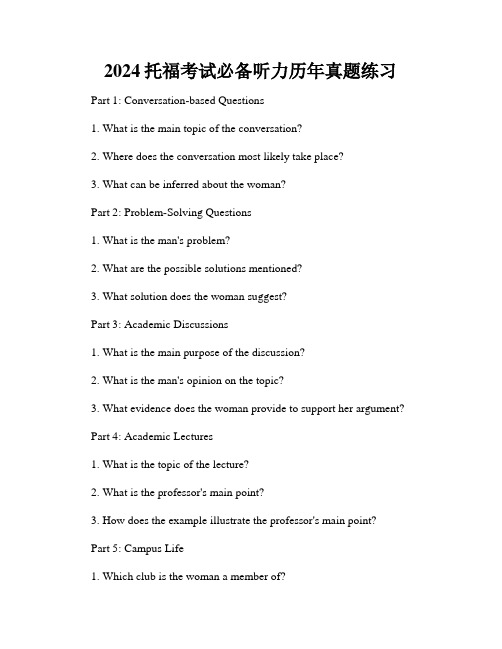
2024托福考试必备听力历年真题练习Part 1: Conversation-based Questions1. What is the main topic of the conversation?2. Where does the conversation most likely take place?3. What can be inferred about the woman?Part 2: Problem-Solving Questions1. What is the man's problem?2. What are the possible solutions mentioned?3. What solution does the woman suggest?Part 3: Academic Discussions1. What is the main purpose of the discussion?2. What is the man's opinion on the topic?3. What evidence does the woman provide to support her argument? Part 4: Academic Lectures1. What is the topic of the lecture?2. What is the professor's main point?3. How does the example illustrate the professor's main point?Part 5: Campus Life1. Which club is the woman a member of?2. Why does the woman need financial support?3. What does the man offer to do for the woman?Part 6: Academic and Social Skills1. What topic does the professor introduce?2. What is one characteristic of the topic?3. How can this characteristic be beneficial?Part 7: Science and Technology1. What is the main function of the new software?2. How does the new software differ from the old version?3. What benefit does the new software bring to users?Part 8: Advanced Level Discussions1. What is the main topic of the conversation?2. What is the man's opinion on the topic?3. How does the woman respond to the man's opinion?As the 2024 TOEFL exam is approaching, it is essential for test-takers to engage in practice sessions that familiarize them with the format and content of the listening section. One effective way to prepare is by practicing with authentic past TOEFL listening questions.In the first part of the listening section, conversation-based questions are asked. These questions assess your ability to understand the main topic of aconversation, the location where the conversation is most likely taking place, and inferencing skills about the individuals involved.The second part of the listening section focuses on problem-solving questions. These questions require you to identify the problem the speaker is facing, analyze potential solutions mentioned, and determine the best solution based on the information provided.Part three comprises academic discussions, where you are expected to identify the main purpose of the discussion, the opinions of the speakers, and supporting evidence used in the conversation.In the fourth part, academic lectures are presented, and you need to comprehend the lecture topic, understand the professor's main point, and recognize how examples or illustrations are used to support the main point.The fifth part revolves around campus life, where you must gather information about the activities, clubs, and student organizations, as well as understand the financial support and assistance offered by individuals or institutions.For the sixth part, academic and social skills are discussed. You are required to recognize the topic introduced by the professor, identify specific characteristics, and understand the potential benefits associated with these characteristics.The seventh part focuses on science and technology, exploring advancements and innovations. It requires you to understand the main functions of software or devices, identify differences between different versions, and recognize the benefits provided by newer technologies.The eighth part consists of advanced level discussions, where complex topics are debated. You are expected to identify the main topic of the conversation, grasp the speakers' opinions, and understand how the conversation unfolds based on different perspectives.By practicing with past TOEFL listening questions, you can improve your listening skills, become more familiar with various question types, and enhance your understanding of spoken English. Regular practice will help you feel more confident and prepared for the listening section of the 2024 TOEFL exam.Remember to listen carefully, take notes when necessary, and pay attention to key details and information. Developing good listening strategies and practicing with a variety of listening materials will significantly contribute to your success in the TOEFL listening section.。
小托福测试题
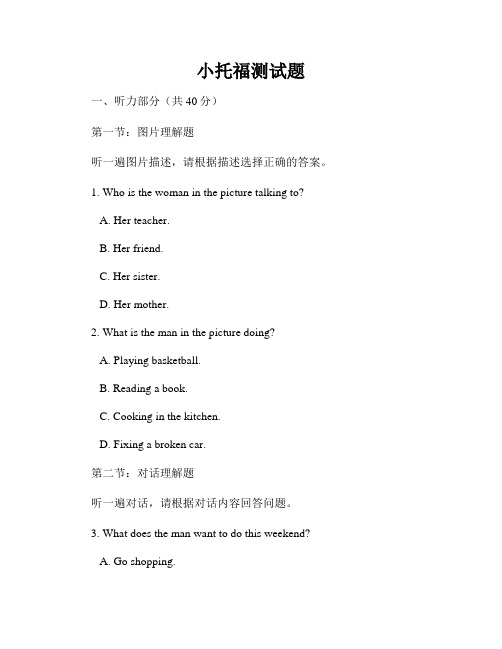
小托福测试题一、听力部分(共40分)第一节:图片理解题听一遍图片描述,请根据描述选择正确的答案。
1. Who is the woman in the picture talking to?A. Her teacher.B. Her friend.C. Her sister.D. Her mother.2. What is the man in the picture doing?A. Playing basketball.B. Reading a book.C. Cooking in the kitchen.D. Fixing a broken car.第二节:对话理解题听一遍对话,请根据对话内容回答问题。
3. What does the man want to do this weekend?A. Go shopping.B. Have a picnic.C. Visit a museum.D. Go to the beach.4. Where does the woman most likely work?A. A hotel.B. A restaurant.C. A hospital.D. A library.第三节:短文理解题听两遍短文,请根据短文内容选择正确的答案。
5. What is the main purpose of this notice?A. To inform students about class cancellation.B. To announce the schedule for the upcoming exams.C. To remind students of the school rules.D. To promote a new club on campus.6. What does the speaker suggest the students do?A. Attend the lecture next week.B. Complete the online quiz immediately.C. Submit their assignments before the deadline.D. Sign up for the after-school study group.二、阅读部分(共40分)第一节:阅读选择题阅读下列短文,然后根据短文内容选择正确的答案。
托福听力评分标准表28题
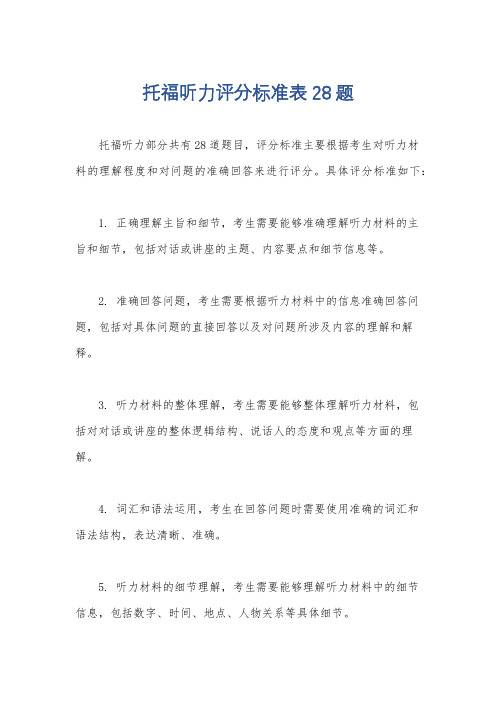
托福听力评分标准表28题
托福听力部分共有28道题目,评分标准主要根据考生对听力材
料的理解程度和对问题的准确回答来进行评分。
具体评分标准如下:
1. 正确理解主旨和细节,考生需要能够准确理解听力材料的主
旨和细节,包括对话或讲座的主题、内容要点和细节信息等。
2. 准确回答问题,考生需要根据听力材料中的信息准确回答问题,包括对具体问题的直接回答以及对问题所涉及内容的理解和解释。
3. 听力材料的整体理解,考生需要能够整体理解听力材料,包
括对对话或讲座的整体逻辑结构、说话人的态度和观点等方面的理解。
4. 词汇和语法运用,考生在回答问题时需要使用准确的词汇和
语法结构,表达清晰、准确。
5. 听力材料的细节理解,考生需要能够理解听力材料中的细节
信息,包括数字、时间、地点、人物关系等具体细节。
6. 听力材料的推理和推断,考生需要具备一定的推理和推断能力,能够根据听力材料中的信息进行合理推测和推断。
以上就是托福听力部分的评分标准,考生在备考时应该注重对以上各个方面的训练和提高,以便在考试中取得更好的成绩。
希望这些信息对你有所帮助。
托福英语阅读与听力能力测试 选择题 62题
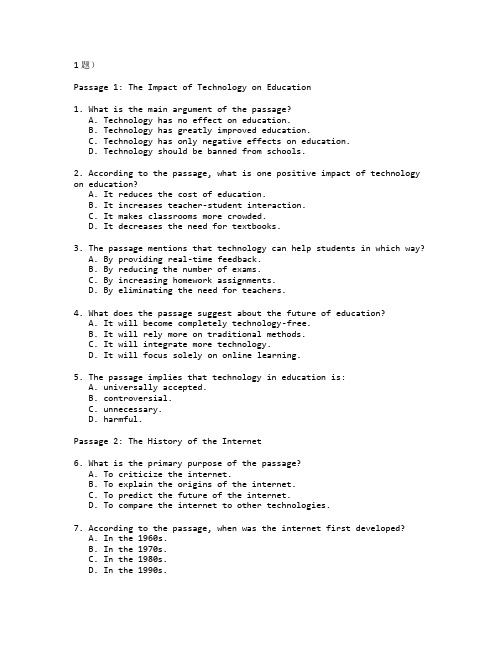
1题)Passage 1: The Impact of Technology on Education1. What is the main argument of the passage?A. Technology has no effect on education.B. Technology has greatly improved education.C. Technology has only negative effects on education.D. Technology should be banned from schools.2. According to the passage, what is one positive impact of technology on education?A. It reduces the cost of education.B. It increases teacher-student interaction.C. It makes classrooms more crowded.D. It decreases the need for textbooks.3. The passage mentions that technology can help students in which way?A. By providing real-time feedback.B. By reducing the number of exams.C. By increasing homework assignments.D. By eliminating the need for teachers.4. What does the passage suggest about the future of education?A. It will become completely technology-free.B. It will rely more on traditional methods.C. It will integrate more technology.D. It will focus solely on online learning.5. The passage implies that technology in education is:A. universally accepted.B. controversial.C. unnecessary.D. harmful.Passage 2: The History of the Internet6. What is the primary purpose of the passage?A. To criticize the internet.B. To explain the origins of the internet.C. To predict the future of the internet.D. To compare the internet to other technologies.7. According to the passage, when was the internet first developed?A. In the 1960s.B. In the 1970s.C. In the 1980s.D. In the 1990s.8. The passage mentions that the internet was initially created for:A. commercial use.B. military purposes.C. educational purposes.D. personal entertainment.9. What does the passage say about the growth of the internet?A. It has been slow and steady.B. It has been rapid and exponential.C. It has been limited to certain countries.D. It has been controlled by a single entity.10. The passage suggests that the internet has transformed which aspect of society?A. Education.B. Transportation.C. Agriculture.D. Healthcare.Passage 3: The Role of Renewable Energy11. What is the main topic of the passage?A. The disadvantages of renewable energy.B. The history of renewable energy.C. The importance of renewable energy.D. The comparison between renewable and non-renewable energy.12. According to the passage, what is one benefit of renewable energy?A. It is cheaper than non-renewable energy.B. It produces more jobs.C. It is easier to store.D. It is more reliable.13. The passage mentions that renewable energy can help address which g lobal issue?A. Overpopulation.B. Climate change.C. Economic inequality.D. Political instability.14. What does the passage suggest about the future of energy production?A. It will continue to rely on fossil fuels.B. It will shift towards renewable sources.C. It will become more centralized.D. It will decrease in overall consumption.15. The passage implies that the transition to renewable energy is:A. already complete.B. impossible.C. challenging but achievable.D. unnecessary.Passage 4: The Effects of Globalization on Culture16. What is the central theme of the passage?A. The benefits of globalization.B. The negative impacts of globalization.C. The cultural changes caused by globalization.D. The economic effects of globalization.17. According to the passage, what is one effect of globalization on cu lture?A. It increases cultural diversity.B. It homogenizes cultures.C. It preserves traditional practices.D. It isolates cultures.18. The passage mentions that globalization can lead to:A. increased cultural awareness.B. loss of cultural identity.C. greater economic stability.D. reduced social inequality.19. What does the passage suggest about the relationship between global ization and culture?A. It is always positive.B. It is always negative.C. It is complex and multifaceted.D. It is irrelevant.20. The passage implies that the impact of globalization on culture is:A. universally accepted.B. widely debated.C. insignificant.D. easily managed.Passage 5: The Importance of Biodiversity21. What is the main focus of the passage?A. The threats to biodiversity.B. The economic benefits of biodiversity.C. The ecological importance of biodiversity.D. The historical perspective on biodiversity.22. According to the passage, what is one reason biodiversity is import ant?A. It increases tourism.B. It provides genetic resources.C. It reduces pollution.D. It enhances human health.23. The passage mentions that biodiversity can contribute to:A. economic growth.B. environmental stability.C. social cohesion.D. technological innovation.24. What does the passage suggest about the current state of biodiversi ty?A. It is increasing.B. It is stable.C. It is declining.D. It is unaffected by human activities.25. The passage implies that protecting biodiversity is:A. a low priority.B. an impossible task.C. a global responsibility.D. a local issue.Passage 6: The Evolution of Transportation26. What is the main subject of the passage?A. The history of transportation.B. The future of transportation.C. The economic impact of transportation.D. The environmental effects of transportation.27. According to the passage, what is one advancement in transportation?A. The invention of the bicycle.B. The development of high-speed trains.C. The use of horses for travel.D. The reliance on walking.28. The passage mentions that transportation has influenced:A. social interactions.B. agricultural practices.C. industrial production.D. educational systems.29. What does the passage suggest about the future of transportation?A. It will become less important.B. It will focus on sustainability.C. It will revert to traditional methods.D. It will be controlled by governments.30. The passage implies that the evolution of transportation is:A. complete.B. stagnant.C. ongoing.D. irrelevant.Passage 7: The Role of Public Health Policies31. What is the main idea of the passage?A. The ineffectiveness of public health policies.B. The importance of public health policies.C. The history of public health policies.D. The comparison between public and private health policies.听力部分(共31题)Listening Section 1: Interview with a Climate Scientist32. What is the main topic of the interview?A. The history of climate science.B. The current state of climate change.C. The future predictions of climate change.D. The personal life of the climate scientist.33. According to the scientist, what is one cause of climate change?A. Increased solar activity.B. Volcanic eruptions.C. Human activities.D. Cosmic radiation.34. The scientist mentions that climate change can lead to:A. more frequent natural disasters.B. reduced agricultural productivity.C. increased economic growth.D. improved air quality.35. What does the scientist suggest we should do to address climate cha nge?A. Ignore it.B. Invest in renewable energy.C. Increase fossil fuel usage.D. Focus on space exploration.36. The scientist implies that the public's understanding of climate ch ange is:A. comprehensive.B. limited.C. incorrect.D. irrelevant.Listening Section 2: Lecture on Artificial Intelligence37. What is the main focus of the lecture?A. The history of artificial intelligence.B. The current applications of artificial intelligence.C. The future of artificial intelligence.D. The ethical concerns of artificial intelligence.38. According to the lecturer, what is one benefit of artificial intell igence?A. It reduces human error.B. It increases unemployment.C. It slows down technological progress.D. It consumes more energy.39. The lecturer mentions that artificial intelligence can be used in:A. agriculture.B. healthcare.C. finance.D. all of the above.40. What does the lecturer suggest about the future of artificial intel ligence?A. It will replace human workers.B. It will be limited to specific industries.C. It will integrate more with human activities.D. It will be banned.41. The lecturer implies that the development of artificial intelligence is:A. controlled by a few companies.B. a global effort.C. a threat to humanity.D. unnecessary.Listening Section 3: Discussion on Urban Planning42. What is the main subject of the discussion?A. The history of urban planning.B. The challenges of urban planning.C. The future of urban planning.D. The personal experiences of urban planners.43. According to the discussion, what is one challenge in urban plannin g?A. Lack of funding.B. Overpopulation.C. Environmental degradation.D. All of the above.44. The discussion mentions that urban planning can address:A. traffic congestion.B. housing shortages.C. public health issues.D. all of the above.45. What does the discussion suggest about the role of urban planners?A. They are irrelevant.B. They are decision-makers.C. They are only advisors.D. They are historians.46. The discussion implies that urban planning is:A. a simple task.B. a complex and dynamic process.C. a static process.D. a luxury.Listening Section 4: Talk on Mental Health47. What is the main topic of the talk?A. The history of mental health treatment.B. The current state of mental health.C. The future of mental health care.D. The personal experiences of mental health professionals.48. According to the speaker, what is one challenge in mental health ca re?A. Lack of awareness.B. Overmedication.C. Stigma.D. All of the above.49. The speaker mentions that mental health care can be improved by:A. increasing funding.B. promoting awareness.C. reducing regulations.D. all of the above.50. What does the speaker suggest about the future of mental health car e?A. It will decline.B. It will improve.C. It will remain unchanged.D. It will be privatized.51. The speaker implies that mental health care is:A. a low priority.B. a global issue.C. a personal issue.D. a luxury.Listening Section 5: Presentation on Space Exploration52. What is the main focus of the presentation?A. The history of space exploration.B. The current missions in space exploration.C. The future of space exploration.D. The personal experiences of astronauts.53. According to the presenter, what is one benefit of space exploratio n?A. It increases national pride.B. It advances scientific knowledge.C. It creates jobs.D. All of the above.54. The presenter mentions that space exploration can lead to:A. technological innovations.B. environmental degradation.C. economic instability.D. social isolation.55. What does the presenter suggest about the future of space explorati on?A. It will be abandoned.B. It will be limited to Earth's orbit.C. It will expand to other planets.D. It will be controlled by a single country.56. The presenter implies that space exploration is:A. a waste of resources.B. a global endeavor.C. a national competition.D. a personal achievement.Listening Section 6: Conversation on Food Security57. What is the main subject of the conversation?A. The history of food security.B. The current challenges in food security.C. The future of food security.D. The personal experiences of farmers.58. According to the conversation, what is one challenge in food securi ty?A. Climate change.B. Overpopulation.C. Economic instability.D. All of the above.59. The conversation mentions that food security can be improved by:A. increasing agricultural productivity.B. reducing food waste.C. promoting sustainable farming practices.D. all of the above.60. What does the conversation suggest about the role of governments in food security?A. They are irrelevant.B. They are the main problem.C. They have a crucial role.D. They should be abolished.61. The conversation implies that food security is:A. a local issue.B. a global issue.C. a personal issue.D. a luxury.Listening Section 7: Debate on Education Reform62. What is the main topic of the debate?A. The history of education reform.B. The current state of education reform.C. The future of education reform.D. The personal experiences of educators.答案1. B2. B3. A4. C5. B6. B7. A8. B9. B10. A11. C12. B13. B14. B15. C16. C17. B18. B19. C20. B21. C22. B23. B24. C25. C26. A27. B28. A29. B30. C31. B32. B33. C34. A35. B36. B37. B38. A39. D40. C41. B42. B43. D44. D45. B46. B47. B48. D49. B50. B51. B52. C53. D54. A55. C56. B57. B58. D59. D60. C61. B62. C。
托福听力测试题及答案
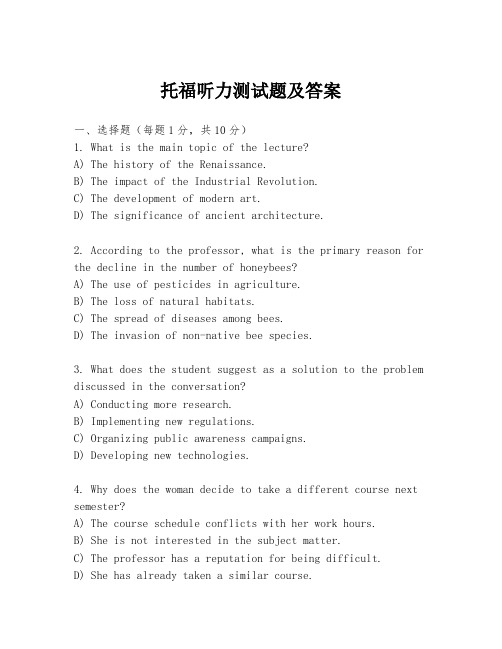
托福听力测试题及答案一、选择题(每题1分,共10分)1. What is the main topic of the lecture?A) The history of the Renaissance.B) The impact of the Industrial Revolution.C) The development of modern art.D) The significance of ancient architecture.2. According to the professor, what is the primary reason for the decline in the number of honeybees?A) The use of pesticides in agriculture.B) The loss of natural habitats.C) The spread of diseases among bees.D) The invasion of non-native bee species.3. What does the student suggest as a solution to the problem discussed in the conversation?A) Conducting more research.B) Implementing new regulations.C) Organizing public awareness campaigns.D) Developing new technologies.4. Why does the woman decide to take a different course next semester?A) The course schedule conflicts with her work hours.B) She is not interested in the subject matter.C) The professor has a reputation for being difficult.D) She has already taken a similar course.5. What is the main purpose of the campus tour mentioned in the lecture?A) To introduce new students to the campus facilities.B) To highlight the university's academic achievements.C) To promote the university to potential students.D) To raise funds for campus improvements.二、填空题(每题1分,共5分)6. The speaker mentions that the _______ is a key factor in determining the success of a business.7. In the dialogue, the man suggests that they should _______ before making a decision.8. The professor explains that the _______ theory has been widely accepted in the field of psychology.9. The woman is concerned about the _______ of the new policy on the local community.10. The student is looking for a part-time job that offers_______ and flexible hours.三、简答题(每题2分,共4分)11. Summarize the main points of the lecture on environmental conservation.12. What are the potential benefits of the proposed research project discussed in the conversation?四、论述题(每题3分,共3分)13. Discuss the role of technology in modern education andits implications for the future of learning.答案:1-5: D A C A C6. innovation7. consult with an expert8. cognitive dissonance9. impact10. health insurance11. The lecture covered the importance of biodiversity, the threats to natural habitats, and the need for sustainable practices.12. The research could lead to new treatments for diseases, improve public health, and contribute to scientific knowledge.13. Technology has revolutionized education by providing access to a wealth of information and interactive learning tools. However, it also raises concerns about the potential loss of human interaction and the digital divide.。
托福(听力)历年真题试卷汇编6(题后含答案及解析)
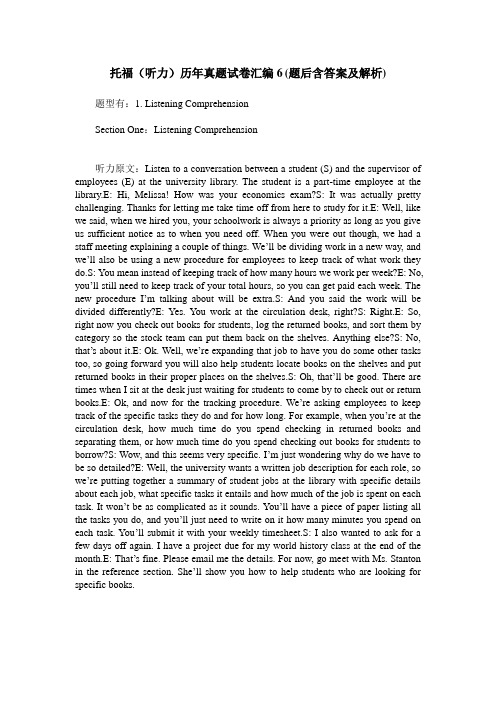
托福(听力)历年真题试卷汇编6(题后含答案及解析) 题型有:1. Listening ComprehensionSection One:Listening Comprehension听力原文:Listen to a conversation between a student (S) and the supervisor of employees (E) at the university library. The student is a part-time employee at the library.E: Hi, Melissa! How was your economics exam?S: It was actually pretty challenging. Thanks for letting me take time off from here to study for it.E: Well, like we said, when we hired you, your schoolwork is always a priority as long as you give us sufficient notice as to when you need off. When you were out though, we had a staff meeting explaining a couple of things. We’ll be dividing work in a new way, and we’ll also be using a new procedure for employees to keep track of what work they do.S: You mean instead of keeping track of how many hours we work per week?E: No, you’ll still need to keep track of your total hours, so you can get paid each week. The new procedure I’m talking about will be extra.S: And you said the work will be divided differently?E: Yes. You work at the circulation desk, right?S: Right.E: So, right now you check out books for students, log the returned books, and sort them by category so the stock team can put them back on the shelves. Anything else?S: No, that’s about it.E: Ok. Well, we’re expanding that job to have you do some other tasks too, so going forward you will also help students locate books on the shelves and put returned books in their proper places on the shelves.S: Oh, that’ll be good. There are times when I sit at the desk just waiting for students to come by to check out or return books.E: Ok, and now for the tracking procedure. We’re asking employees to keep track of the specific tasks they do and for how long. For example, when you’re at the circulation desk, how much time do you spend checking in returned books and separating them, or how much time do you spend checking out books for students to borrow?S: Wow, and this seems very specific. I’m just wondering why do we have to be so detailed?E: Well, the university wants a written job description for each role, so we’re putting together a summary of student jobs at the library with specific details about each job, what specific tasks it entails and how much of the job is spent on each task. It won’t be as complicated as it sounds. You’ll have a piece of paper listing all the tasks you do, and you’ll just need to write on it how many minutes you spend on each task. You’ll submit it with your weekly timesheet.S: I also wanted to ask for a few days off again. I have a project due for my world history class at the end of the month.E: That’s fine. Please email me the details. For now, go meet with Ms. Stanton in the reference section. She’ll show you how to help students who are looking for specific books.1.What is the conversation mainly about?A.Additional tasks the student will be expected to carry outB.The student’s interest in switching jobs at the libraryC.Procedures the student should use to request time of her workD.An evaluation of the student’s performance at her library job正确答案:A解析:内容主旨题。
托福考试2024听力历年真题答案解析

托福考试2024听力历年真题答案解析2024年的托福考试听力部分,如往年一样,包含了一系列听力材料和相关问题。
本文将对历年真题中的听力部分进行题目解析和答案解释,以帮助考生更好地备考。
[介绍段]在托福考试听力部分,考生需要听取一段语音材料,然后回答几个与材料相关的问题。
这些材料可以是学术讲座、对话、课堂讨论等。
对于每种材料,考生需要仔细倾听,并在听完后选择正确的答案。
以下是对几个典型历年真题的解析。
[题目一]Question: What is the main topic of the lecture?听力材料:一段讲座内容,讲述关于生态系统中濒临灭绝的物种。
解析:这道题目需要考生仔细倾听讲座内容,判断讲座的主要话题。
在听力材料中,讲师提到了一系列与生态系统和濒临灭绝物种相关的信息。
考生需要筛选出这些信息并进行归纳,最终选择与之相关的答案。
答案解释:主要讲座话题是关于生态系统中濒临灭绝的物种。
在听力材料中,讲师提到了研究人员进行调查、濒临灭绝物种对生态系统的重要性等相关内容。
因此,正确答案应选择与这个主题相关的选项。
[题目二]Question: What is the relationship between the two speakers?听力材料:一段对话,讨论两位发言者的关系。
解析:这道题目需要考生仔细研究对话内容,判断两位发言者之间的关系。
在对话中,两位发言者可能会透露出彼此之间的身份、职位或熟悉程度等信息。
考生需要根据对话内容进行分析,并选择最符合描述的答案。
答案解释:根据对话中的内容,我们可以推断出两位发言者是一位教授和一位学生。
在对话中,教授提到了自己的研究、学生的作业等相关内容,这表明教授与学生之间存在一种教育关系。
[题目三]Question: What is the purpose of the conversation?听力材料:一段对话,讨论对话的目的。
解析:这道题目需要考生理解对话中的目的或主要内容。
- 1、下载文档前请自行甄别文档内容的完整性,平台不提供额外的编辑、内容补充、找答案等附加服务。
- 2、"仅部分预览"的文档,不可在线预览部分如存在完整性等问题,可反馈申请退款(可完整预览的文档不适用该条件!)。
- 3、如文档侵犯您的权益,请联系客服反馈,我们会尽快为您处理(人工客服工作时间:9:00-18:30)。
Texts May Beat Phone Calls for Survey Honest Answers Someone doing a survey calls and asks: "How many times a week would you say you exercise?" What do you tell them? And would it be 【1】if the survey was being done via text rather than telephone?Maybe. Because people are more likely to 【2】honest and accurate information via text messages than voice interviews. So finds a study reported at the annual meeting of the American Association for Public Opinion Research.The researchers thought most people would rather share sensitive or controversial information over the phone, a much more【3】technology. Plus, texting creates a possibly-off-putting permanent, stored record of questions and answers.The researchers are still trying to interpret the results. One thought is that texting, 【4】talking, can be done at the participant’s leisure and more privately, which could lead to more truthfulness.The research team reached out to only 600 iPhone users. So the work needs to be extended. But if it’s 【5】, it could mean that the best way to poll the public would be to ditch the dinner time phone call in favor of a tea time text.。
